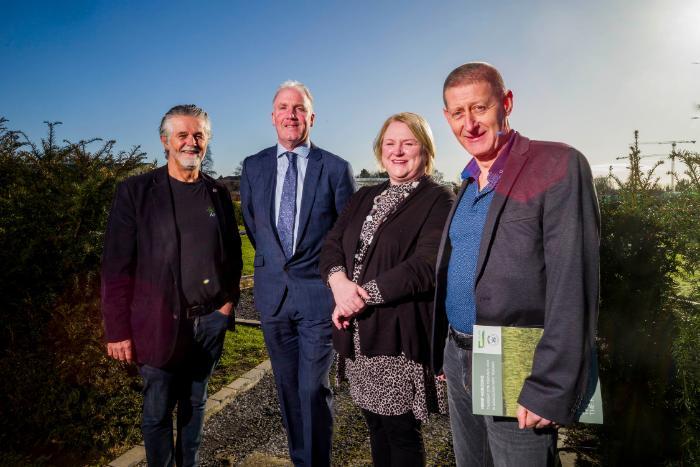23 March 2025
Industrial Hemp Conference Demonstrates Ireland’s Potential in Sustainable Agriculture and Industry

The Industrial Hemp Conference, hosted by Teagasc and Textile Composites International, brought together a diverse group of experts, farmers, policymakers, and innovators to explore the transformative potential of industrial hemp in Ireland’s agriculture and industry. Barry Caslin, tells us more.
The event highlighted the crop’s economic, environmental, and social opportunities while addressing the structural and market developments needed, for the sector to thrive.
A Crop for the Future
The conference commenced with a detailed chronicle of hemp research in Ireland. It highlighted the pioneering contributions of former Teagasc researchers, including Michael Neelan in the 1960s, who demonstrated the potential of Irish hemp for paper and textiles. Subsequent studies by Dr. Jim Crowley and Dr. John Finnan were revisited, exploring hemp as a resource for medium-density fibreboard and renewable energy. The agronomic benefits of the crop were emphasised, such as enhancing soil health, suppressing weeds, and serving as an excellent break crop. However, speakers advised caution against widespread cultivation until robust markets and infrastructure are established: “Hemp offers numerous benefits, but without strong market structures and processing facilities, scaling up will be challenging.”
A Global Perspective on Hemp’s Transformative Potential
Keynote speaker Charles Kovess, President of the Australian Industrial Hemp Association, delivered an inspiring vision for hemp’s role in Ireland’s sustainable future. Kovess highlighted hemp’s versatility, from its use in textiles and construction to its environmental benefits, including carbon sequestration and biodegradable plastics. Addressing the textile industry, Kovess explained how hemp could replace labour-intensive processes with capital-intensive, cutting-edge machinery, empowering Irish farmers to supply premium raw materials to global brands like Ralph Lauren. He also championed a cooperative model where groups of farmers could share decortication equipment, adding value to their crops and enhancing their profitability.“Ireland has the potential to lead the world in sustainable hemp production, but this requires investment in infrastructure, collaboration, and government support,” said Kovess.
Innovative Applications in Construction
Hemp’s potential in construction was a key theme of the conference, explored in depth through panel discussions featuring industry leaders. Patrick Daly from TU Dublin highlighted the opportunities for hemp in modular construction and bio-based materials, emphasising the importance of integrating these methods into education and certification systems. Daly noted:“Hempcrete is already meeting standards in Europe; in Ireland, we need localised production and government support to make it mainstream.”Ronan McDermott of HempBuild and Steve Allin of the European Industrial Hemp Alliance shared real-world examples of hemp’s use in retrofitting homes and building sustainable, fire-resistant structures. Hemp houses were praised for their thermal regulation, energy efficiency, and health benefits, particularly in Ireland’s damp climate. McDermott emphasised the importance of certification and collaboration with international manufacturers to expand the industry. Kingspan’s Hannah Roughneen brought a corporate perspective, displaying their hemp insulation products and discussing the challenges of scaling up bio-based materials. She acknowledged the growing demand in mainland Europe but called for more investment and awareness in Ireland: “Hemp has the potential to revolutionise construction, but we need to address misconceptions about its effectiveness compared to traditional materials.”
Economic and Environmental Benefits
The economic viability of hemp was a recurring topic, with speakers like farmer Edward Hanbidge sharing their experiences. Hanbidge, who transitioned to hemp seed production in 2020, highlighted the crop’s suitability for Ireland’s fertile soils and moderate climate. He discussed the challenges of market development and the need for infrastructure, particularly decorticators, to process hemp into valuable products like fibre and hurd. Dr Fiona Thorne of Teagasc explored the role of hemp in diversifying Irish agriculture, noting its alignment with the EU’s Common Agricultural Policy (CAP) and Ireland’s Climate Action Plan. Hemp’s low input requirements and carbon sequestration capabilities make it an ideal crop for sustainable farming systems. Thorne highlighted: “Hemp can support Ireland’s climate goals while providing farmers with new revenue streams, but significant investment in processing facilities and market development is required.”
Challenges and Calls for Action
While the conference highlighted hemp’s potential, it also highlighted the barriers to its widespread adoption in Ireland. These include the lack of processing infrastructure, limited certification for hemp-based products, and regulatory challenges, such as hemp’s association with the Misuse of Drugs Act. Robert Johnson, a panellist, called for legislative clarity and a unified message to policymakers: “Hemp is an industrial crop, and its regulation should reflect that. Without clear policies, the sector cannot scale.” Ian Marshall from Queen’s University Belfast stressed the need for cross-border collaboration and innovative funding solutions to overcome these hurdles. He urged stakeholders to present a cohesive case to the government, highlighting the economic and environmental benefits of a thriving hemp industry.
A Vision for the Future
The conference concluded with a vision for Ireland to become a leader in the global hemp industry. Speakers called for an investment of €100 million to establish processing facilities, support farmer cooperatives, and develop markets for hemp products. The importance of education and public awareness was emphasised to dispel misconceptions about hemp and its applications. With its natural resources, expertise, and ambition, Ireland has the potential to make hemp a cornerstone of its sustainable future. However, achieving this vision will require the right structures, policies, and investments to turn potential into reality.
Further Information
For those interested in exploring the presentations and discussions from the conference, including research findings and industry insights, read more about the Irish Industrial Hemp Conference here.
